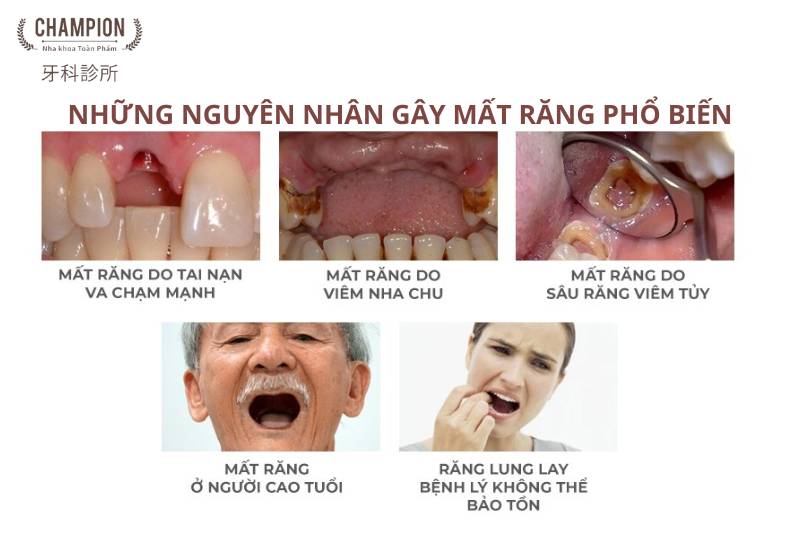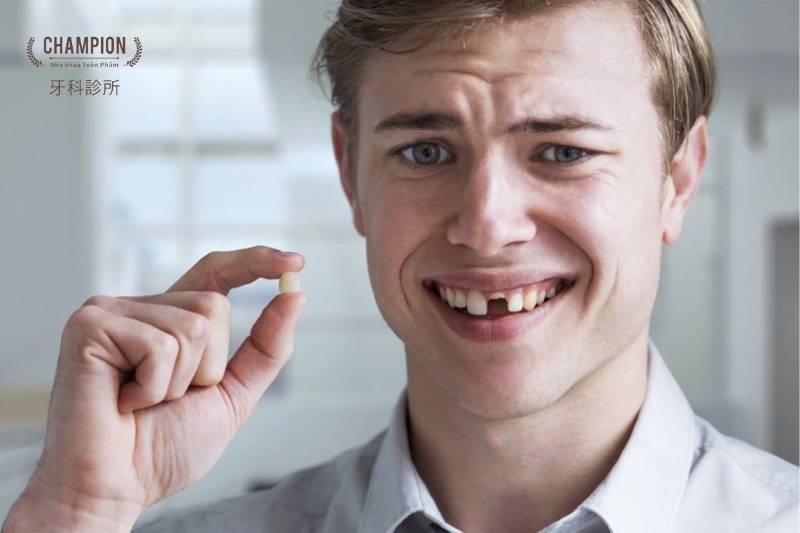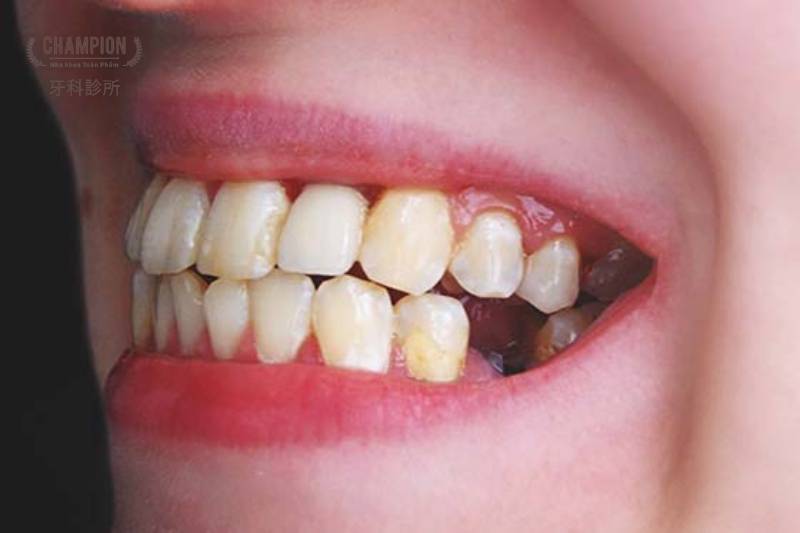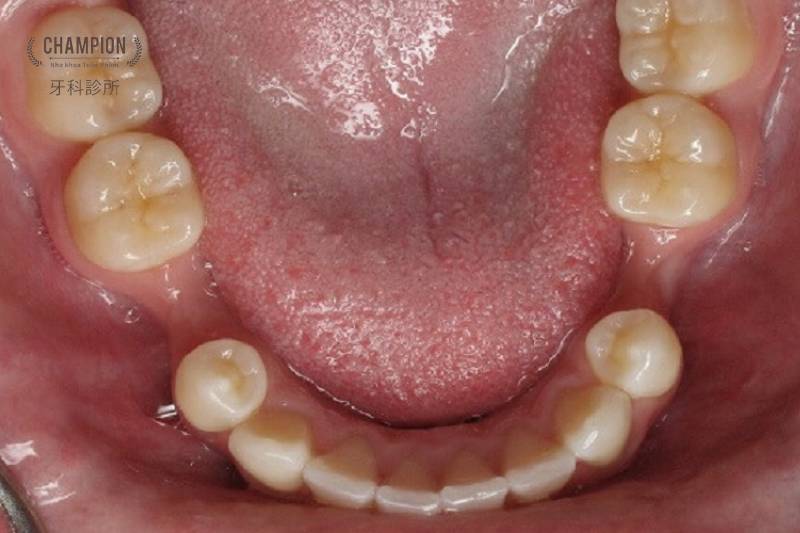Tooth loss is a common condition affecting many people, greatly impacting chewing function and aesthetics. What causes tooth loss? Should you get dental implants after losing teeth? Let's explore the answers in this article.
10 Common Causes of Tooth Loss
There are many causes that can lead to tooth loss. Below are the 10 common causes of tooth loss that we often encounter:
Tooth Decay
Tooth decay, also known as dental caries, is the most prevalent cause of tooth loss. It occurs when acids produced by plaque bacteria erode through the enamel and infect the inner dentin and pulp. Without treatment, the decay continues to spread inside the tooth, causing severe pain, infection, and abscess. Advanced tooth decay can fully penetrate the tooth roots or fracture the tooth extensively, requiring extraction.
Gum Disease
Gum disease comes in two main stages - gingivitis and periodontitis. Gingivitis involves inflammation of the gums from plaque buildup. Periodontitis is a severe form where inflammation spreads deeper and destroys the tissues and bone supporting the teeth. The sockets become severely weakened, leading to loosening or loss of teeth.
Dental Trauma
Traumatic dental injuries often arise from sports collisions, vehicular accidents, falls and other impacts. Depending on the force, trauma can crack the enamel, displace the tooth from its socket, or fully dislodge it. Knocked out permanent teeth have the best prognosis for recovery if replanted quickly. Extraction is required if the tooth root or supporting structures are too severely damaged.

Other Gum Diseases
Gum conditions like gingivitis, oral lichen planus and pemphigoid can all initiate gum inflammation and erosion. Without prompt treatment, they allow more plaque to accumulate along the gumline worsening the condition. Eventually, the gum recession and bone loss lead to tooth loosening and extraction.
Excessive Tooth Wear
Tooth wear occurs with aging as the outer enamel erodes slightly over time. However, conditions like bruxism (teeth grinding), acidic diets or gastric reflux accelerate enamel loss beyond normal limits. As more dentin gets exposed, teeth become hypersensitive and more susceptible to decay. The excessive wear and damage often requires extraction and dental prosthesis.
Abnormal Tooth Development
Developmental conditions like tooth agenesis, microdontia, supernumerary teeth, or ectopic tooth eruption can impact the proper formation and alignment of teeth. The resulting crowded, overlapping teeth are harder to clean and more prone to caries. Orthodontic treatment can help guide normal eruption and development. But in severe cases, extraction of misaligned teeth may be required.
Sjogren's Syndrome
Sjogren’s syndrome reduces saliva production causing chronic dry mouth. Saliva contains antibacterial compounds and minerals that protect tooth enamel. Thus, lack of saliva allows more bacterial growth, accelerating dental caries. The condition also increases risks of fungal infections like oral thrush which can progress to tooth loss.
Drug-Induced Damage
Tooth decay risks increase with long-term use of medicines like antihistamines, antidepressants, and opioids that reduce saliva flow. Some medications used in cancer like doxorubicin and radiation therapy may weaken enamel or cause tooth discoloration or loss. Maintaining good oral hygiene and regular dental visits helps reduce medication-related tooth damage.
Autoimmune Disorders
Autoimmune disorders like lupus and rheumatoid arthritis cause systemic inflammation even affecting the gums and jaw bones. The chronic inflammation destroys the tissues supporting the teeth leading to progressive loosening and eventual tooth loss if not treated promptly.
Aging
Tooth loss risks increase with age as gums naturally recede and the jaw bone loses density. Dental plaque also accumulates more easily due to reduced manual dexterity and compromised immune function in seniors. Certain chronic diseases like diabetes and osteoporosis further accelerate gum disease and tooth loss. Proper home care, regular dental cleanings and early treatment help maintain tooth health longer.

>> See more: Is Tooth Loss Serious? What to Know When You Lose a Tooth
Consequences of Tooth Loss
Tooth loss can lead to many serious consequences such as:
Chewing and Swallowing Difficulties
Tooth loss impairs chewing capacity and bite force. It becomes harder to bite off and grind down foods properly before swallowing. Without molars, chewing efficiency can decrease up to 50%. Partially chewed food enters the digestive tract causing indigestion, bloating, and gastrointestinal issues. Swallowing larger chunks also increases risks of choking. Overall, impaired chewing hinders proper nutrient absorption leading to malnutrition over time.
Facial Structure Changes
After extractions, the surrounding bone and gums start to deteriorate without the stimulation from the tooth root. This causes diminished facial support, sunken cheeks, and loose skin folds around the mouth. Jawbone loss also alters the natural face shape and may cause the lower face to droop or shorten. It contributes to an aged, sullen appearance over time.
Speech Impediment
Front teeth help form sounds like f, v, th, s, z. Losing them causes a whistle or lisping effect when speaking certain words. Missing back teeth reduce the oral cavity space and tongue contact needed to enunciate some syllables. Dentures help improve speech but may still impede articulation and clarity compared to natural teeth.
Social and Psychological Impact
Tooth loss, especially of front teeth, detracts from an appealing smile. People tend to feel self-conscious and embarrassed to smile or laugh openly. This hurts self-esteem and limits social engagement. Unsightly gaps may also evoke negative perceptions when meeting others socially or professionally. Seeking timely treatments to replace missing teeth helps restore an attractive smile and confidence.
Increased Disease Risks
Open extraction sites create direct pathways for bacteria to enter the bloodstream. Remaining teeth are also at higher risk as they shift gradually into the gaps. The bacteria can spread infection and inflammation systemically, increasing susceptibility to heart disease, stroke, diabetes complications, and certain cancers. Dental implants help prevent tooth migration and close the vulnerable extraction sites after tooth removal.

Should You Get Dental Implants After Tooth Loss?
Tooth loss significantly impacts functions and aesthetics. Thus, you should get replacements as soon as possible. Here are reasons for getting dental implants after tooth loss:
- Implants restore chewing ability and speech.
- They prevent remaining teeth from loosening or loss.
- Early implants help maintain bone level.
- They restore facial function and aesthetics, improving self-confidence.
- Reduced nutrition-related disease risks like diabetes and heart disease.

Champion Dental - Prestigious dental implant address
At Champion Dental Center, we offer comprehensive implant and prosthetic treatments from implants, dentures to braces. With experienced, skilled dentists, Champion Dental delivers high-quality treatments at the most reasonable costs.
Visit Champion Dental today for trusted expert advice and customized treatment planning to regain your best smile confidently. Maintain good oral health habits to prevent regrettable tooth loss. Wishing you strong healthy teeth and a radiant smile!
Above are some insights on the 10 most common causes of tooth loss and why you should get dental implants after losing teeth. Hopefully these useful details help you better understand tooth loss and find proper solutions to restore your smile. Always take care of your own and your family’s dental health to prevent unfortunate tooth loss. Wishing you strong, healthy teeth and a glowing smile!
Vietnamese & English: (028) 5411-2295
中文: (028) 5411-2297 172 Nguyen Luong Bang, Tan Phu Ward, District 7, Ho Chi Minh City.
Fanpage: Champion Dental Clinic 牙科診所
Zalo: Champion Dental Clinic
Youtube: Champion Dental Clinic 牙科診所
 Champion Dental Clinic
Champion Dental Clinic



